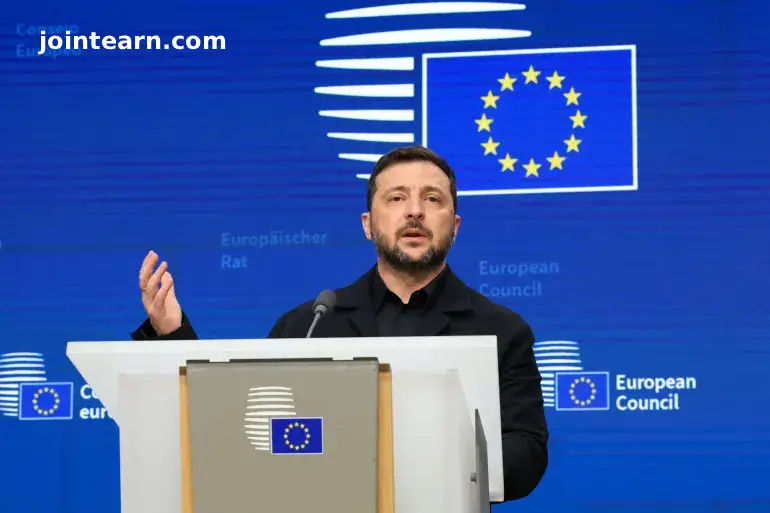
Brussels, October 23, 2025 — European Union leaders have delayed a landmark decision on whether to channel billions in frozen Russian assets toward Ukraine’s defence and reconstruction, after Belgium raised legal and financial concerns that blocked consensus during a high-stakes summit in Brussels.
The long-anticipated talks were meant to secure a €140 billion ($163 billion) “reparation loan” for Kyiv, using profits generated from Russian central bank funds immobilised in the EU since the start of Moscow’s full-scale invasion in 2022. However, the plan’s complexity and questions over its legality have once again postponed action, highlighting divisions within the 27-member bloc over how far to go in financing Ukraine’s war effort.
Belgium’s Objections Stall EU Unity
Belgium, home to Euroclear — the financial institution holding most of the frozen Russian reserves — led the objections that derailed the proposal. Prime Minister Bart De Wever argued that using Russia’s frozen central bank assets to back a loan risked breaching international law and could expose Euroclear to financial liability.
“The EU must ensure that any mechanism we adopt respects international law and protects the stability of our financial system,” De Wever told reporters after the summit. “Belgium cannot endorse a plan that opens legal or fiscal risks.”
The proposal, advanced by the European Commission, would have allowed the EU to borrow matured funds held by Euroclear and use them as collateral for a massive aid loan to Ukraine. The money would then be repaid only if and when Russia compensates Kyiv for wartime damages — effectively making Moscow’s frozen reserves a guarantee for Ukraine’s future recovery.
Russia has denounced the plan as “outright theft” and threatened retaliatory measures against EU nations.
Leaders Seek “Alternative Options”
Following intense negotiations, the final summit communiqué — signed by all leaders except Hungarian Prime Minister Viktor Orbán — was scaled back to a general commitment to “explore financial support options based on Ukraine’s needs.” Those options are expected to be presented at the EU’s next summit in December.
“Russia’s assets should remain immobilised until it ceases its war of aggression against Ukraine and compensates for the damage caused,” the statement read, reaffirming the bloc’s political stance but stopping short of a financial breakthrough.
Diplomats said the setback reflects both legal uncertainty and divergent national interests. While Baltic and Nordic states strongly support tapping Russian funds, Belgium and some southern EU countries worry that unilateral use of state assets could undermine the eurozone’s credibility as a safe financial haven.
Zelenskyy Presses for Swift Action
Ukrainian President Volodymyr Zelenskyy, who attended the Brussels meeting as a guest, urged EU leaders to act decisively, warning that delays could weaken both Ukraine’s resistance and Europe’s credibility.
“Anyone who delays the decision on the full use of frozen Russian assets is not only limiting our defence but also slowing down the EU’s own progress,” Zelenskyy said. He added that Kyiv intends to use much of the funding to purchase European-made weapons and strengthen regional security.
Zelenskyy’s message underscored Ukraine’s growing reliance on Western financial support as its war with Russia enters a grueling third winter, amid renewed missile and drone attacks on Ukrainian cities.
Frozen Assets: The Core of the Debate
After Russia’s invasion of Ukraine in 2022, the European Union froze approximately €200 billion ($232 billion) in Russian central bank assets held mostly in Euroclear accounts. The funds generate billions in interest annually, which the EU has already begun taxing and transferring to Ukraine. However, directly leveraging or repurposing the principal remains legally contentious.
Legal experts warn that redirecting frozen state assets could set a precedent that undermines international property rights and triggers retaliatory measures. “The EU must tread carefully — a misstep could destabilise global confidence in European financial institutions,” said Dr. Katarina Bruns, an international law professor at the University of Amsterdam.
New EU Sanctions Deepen Moscow’s Isolation
The Brussels summit coincided with the EU’s adoption of a new round of sweeping sanctions targeting Russia’s energy sector. The measures include a ban on liquefied natural gas (LNG) imports, closing one of the few remaining channels for Russian energy sales to Europe.
The sanctions came a day after US President Donald Trump announced Washington would impose penalties on Russia’s two largest oil firms, further tightening the Western economic noose around Moscow.
In response, Russian President Vladimir Putin denounced the sanctions as an “unfriendly act” and vowed that Russia would not capitulate under Western pressure. “These attempts to strangle our economy will fail,” Putin said in a televised address from Moscow. “Russia will continue to develop and defend its sovereignty.”
Next Steps for the European Union
With no deal reached in Brussels, EU finance ministers and Commission officials now face the task of reworking the proposal before the December summit. European Council President Charles Michel acknowledged the divisions but said progress was still possible. “We are united in our support for Ukraine,” he stated. “The question is how best to mobilize resources in a way that is both effective and lawful.”
Meanwhile, Kyiv’s allies are pushing for immediate aid. The European Investment Bank (EIB) and individual EU member states are exploring temporary loan guarantees to bridge Ukraine’s budget gap while the frozen-assets plan remains under review.
As Ukraine braces for a harsh winter and Russia escalates its attacks, European leaders face mounting pressure to turn political promises into concrete financial action.


Leave a Reply